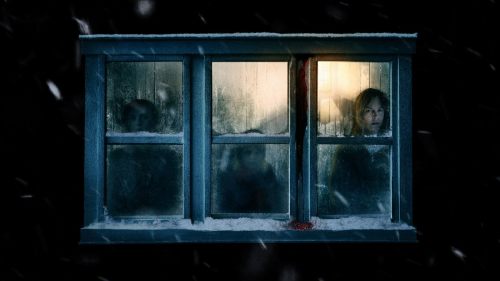Lullaby And Good Fright: GOODNIGHT MOMMY And The Fear Of Family
The Lodge is almost here. Get your tickets now!
Long is the list of films with titles that, upon their international release, have become lost in translation. Just as lengthy: the number of listicles noting how Boogie Nights is called His Great Device Makes Him Famous in China, and Jaws goes by The Teeth of the Sea in France. Such titles are a common occurrence, as well as a commonly discussed occurrence — so the fact that Veronika Franz and Severin Fiala’s debut feature has two monikers is hardly out of the ordinary. That said, instead of being saddled with an overly literal and laughable new name, the Austrian duo’s’ first film benefits from its new title. Ich seh, Ich seh is a perfectly fine moniker, with the German phrase translating to “I see, I see”; however the English-language title of Goodnight Mommy is far superior. Both have a literal air that’s tied to the movie’s secrets — but only one stresses how important family is to this savage and suspenseful psychological horror film, and nods to the feature’s canny way of toying with a fundamental horror trope.
It’s an idea that’s so baked into the horror genre, it’s as common as haunted houses and vengeful spirits: rather than being a wellspring of comfort and safety, one’s family can incite scares, terror and worse. Great horror has always stuck to the basics, probing mortality and security, and this notion contemplates both existential topics — pondering what would happen if, instead of nurturing and caring for you from the moment they brought you into this world, your relatives represented the opposite extreme. Family-focused horror-comedies such as The Addams Family and The Munsters have shown that the macabre and the supportive aren’t mutually exclusive, of course, but horror’s most unnerving family tales hack away at the bonds of blood. After all, what is gothic horror’s most iconic figure, and one of its most emulated — aka Frankenstein’s monster — but a creation rejected by its father-like creator?
What is The Shining if not a tale of a woman and her son trying to cope with their husband and father’s descent into madness? What is Robert Eggers’ recent standout The Witch but a chronicle of a family letting their fears and folklore tear at their kinship — and what is Ari Aster’s Hereditary if not an account of how you can always hurt the ones you love? Psycho’s traumatic mother-son relationship, The Innocents’ possessed children and The Omen’s son of Satan all carve up the idyllic picture of familial contentment, as does The Babadook, focusing on fraught widow who’s jumping out of her skin as much at her attention-seeking son as the pop-up book boogeyman he’s frightened of. It’s easy to find more examples, with Goodnight Mommy slotting into this busy subgenre perfectly. Indeed, Franz and Fiala know exactly which terrain they’re entering. In fact, the filmmaking duo want their viewers to recognize how this situation usually plays out, all so they can add their own spin.
When Goodnight Mommy begins with happy faces singing Brahms’ ‘Guten Abend, gute Nacht’ — nine-year-old Elias’ (Elias Schwarz) favorite song, we later learn — it introduces an idyllic picture that’s set to be subverted. Its next sights, of Elias and his twin brother Lukas (Lukas Schwarz) playing happily in the fields and water surrounding their Austrian countryside home, also have the same flavor. And so it is that their mother (Susanne Wuest) comes home, returning after a medical procedure that has left her face completely bandaged. Looking like a cross between The Invisible Man circa 1933 and Eyes Without a Face’s mask-wearing Christiane, she’s an instantly perturbing figure. While her strapped-up face is visibly disconcerting, including to her two sons, that’s not all that’s off-putting. Although she prefers to keep her distance from the two boys, saying that she needs her rest, when she does interact with Elias and Lukas, she clearly favors the former over the latter.
Keenly observant and curious — and fostering a fondness towards the grotesque, as their big tank full of giant beetles and their eagerness to explore catacombs filled with skulls both demonstrate — Elias and Lukas immediately think that something is amiss with their mom. The more she not only withdraws, but acts frostily towards and Elias and downright ignores Lukas, the more that the boys’ suspicions are raised. Understandably, the tension in the house ratchets up as well. It doesn’t help that family photo albums show their mother as much happier and friendlier, that they find a photograph of her sitting with a woman who could be her twin, or that, when playing a game of ‘Who Am I?’, their mom can’t remember standard details about herself. Elias and Lukas’ theory: that it wasn’t their mother who came home, but someone pretending to be her. That’s not a possibility they’re willing to take lightly.
Although Elias and Lukas are never presented as angelic — indeed, they wouldn’t feel out of place in a Michael Haneke film, and their identical appearance harks back to many a disquieting movie twin and doppelgänger — Franz and Fiala align the audience with the two boys during Goodnight Mommy’s first two-thirds. Via cinematographer Martin Gschlacht, the film isn’t literally framed through the twins’ eyes, but its visuals still emphasize and reflect their perspective. Mother, as she’s only known, always cuts an unsettling figure, with that sensation augmented by the film’s stark, sleek, minimalistic setting — a spacious, sprawling rural house so sparsely appointed that more signs of life are missing than present. And yet, Goodnight Mommy doesn’t unthinkingly condemn Elias and Lukas’ mom. It makes overtly clear just how the boys are feeling, but it also leaves room for questions. Understanding why the twins harbor doubts about their mother couldn’t be easier; however wondering if they’re letting their imaginations get away from them, and misinterpreting the tired, ailing actions of a woman recovering from surgery, is just as natural.
It’s this space — is she? Isn’t she? Are they? Aren’t they? — that Goodnight Mommy so skillfully makes it own, embracing the uncertainty that was always going to accompany the film’s difficult underlying question. No one wants to believe the worst about the person that gave them life, or any other beloved relative, which is what makes movies about fear-inducing family members strike such a chord — and Franz and Fiala, relatives by marriage themselves (she’s married to fellow Austrian filmmaker Ulrich Seidl, he’s Seidl’s nephew), couldn’t convey that reality better. Goodnight Mommy’s viewers are asked to constantly ponder, probe and wonder, especially when Elias and Lukas take their distrust of their mother to violent, brutal and disturbing extremes. It’s clear that this family is by no means a safe haven, but who is really the aggressor and who is the victim?
There’s an answer to that question, as well as a twist. Again, Franz and Fiala know the expectations that accompany any story of children being suspicious of a parent, or vice versa. And while Goodnight Mommy’s game-changer also falls into the tried-and-tested (and easily guessed) category, as does the idea of finding something to fear within a family, it too never feels routine. Instead, it also falls perfectly into place. A child can be scared that’s something is amiss with their mother, the opposite worries can apply as well, and everyone can all be grieving a painful tragedy at the same time. Among Goodnight Mommy’s masterful touches — ranking up there with its meticulous imagery and sound design, as well as its exceptional performances — the film’s willingness to still let uncertainty linger stands out. Even when the answer is clear-cut, it’s also always complicated, chaotic and messy.
As well as realizing that the ones we’re supposed to love — that we’re born to, raised to and taught to before we know much else — can be the ones we’re scared of, Goodnight Mommy also recognizes another truth. Even among family, no one can ever really be totally, wholly, 100-percent sure of anyone. It’s bleak but it’s true, and it links back to the lullaby that the film uses with such effectiveness. Gentle songs sung to children to help them fall asleep, lullabies are crooned to help ease their anxiety about what the night, sleep and their dreams might bring, which is another realm that no one can ever be 100-percent certain of. Suitably lulled by a pleasant melody, kids drift off and trust that everything will be fine. We all do that in families, too, assuming all will be fine — and Goodnight Mommy doesn’t forget it.



